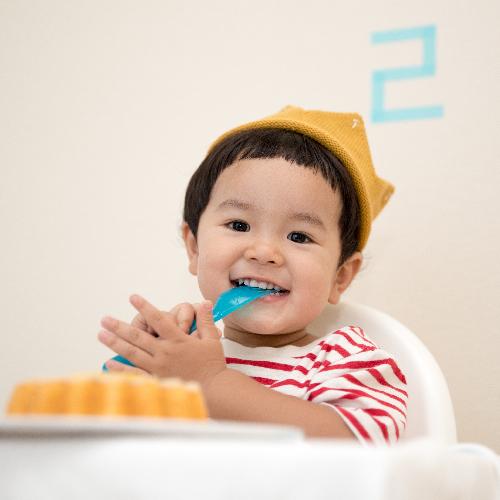HOW TO TAKE CARE OF YOUR BABY'S TEETH
Tinychaps recently conducted an interview with a renowned Orthodontist Dr. Dhaval Oswal and this is what he had to say about taking care of your baby's teeth!
At what age shall I start caring for my baby's teeth?
Baby teeth are important! Healthy dental habits should begin early because tooth decay can develop as soon as the first tooth comes in. Tooth decay is the most common chronic infectious disease of childhood.
How do the teeth get spoiled?
Tooth get spoiled when sweetened liquids or those with natural sugars like milk, fruit juices, etc. stick to their teeth for a long time which causes frequent acid attack which can begin to break down tooth enamel. Also, giving an infant a sugary drink at night before going to bed is harmful. As the flow of saliva decreases during sleep the self cleansing mechanism does not work.
Baby teeth are important to a happy smile and a healthy eating. But since children are prone to cavities now a days due to food they eat and their habits, it is utmost important for parents to avoid bad habits. Habits such as in-between snacking and sipping can increase the chance of cavities as pH of the mouth tends to become more acidic that leads to cavities.
What foods do you recommend should be a part of the regular diet for baby?
There are several foods which should be a part of the regular baby diet. Some of them are mentioned below:
- MILK is a good option for preventing decay in children as it prevents the PH of the mouth to decrease. Milk also is a rich source of calcium which is essential for teeth mineralization.
- When you are giving JUICE to your baby, make sure you are NOT giving it via sipper because the juice is released very slowly and the tooth is exposed for longer period of time for bacteria’s to attack on the tooth. The better option is to serve during meals.
- Whole grain-brown rice, whole- wheat bread can also be added to your toddler’s food, preferably a food without added sugar.
- CHEESE also helps in preventing the teeth from decaying. It helps cleaning the bacteria off of the teeth by increasing pH levels of mouth which helps to reduce the bacterial growth in mouth.
- Sticky food like raisins or candies can be replaced by strawberries, luscious grapes, mangoes or juicy melons, fiber rich food are good for your teeth.
- Crushed apple's can also be given to your baby, which maintains the flow of saliva in the mouth that reduces food lodgment between the teeth.
What foods do you recommend should be AVOIDED as a part of the regular diet for baby?
- Foods which are round in shape, food which is difficult to hold because of its slippery consitency, sticky, and large cut pieces of fruits such as apple, guvava, etc which can lead to choking in kids must be avoided. This can lead to emergency treatment.
- If your kid is less than a year old then whole milk of cow must be avoided as it may develop an allergic reaction which again requires emergency treatment.
- Honey which may be cooked or otherwise also be avoided as it could be contaminated with microbial spores causing botulism.
- Foods which are high in sweet, salt or fats be avoided.
- Foods which are processed and spicy must be avoided.
What are some of the ways to protect the child's tooth decay?
There are certain habits which have to be followed to prevent decaying. Make sure your kid gargles before and after every meal. Avoid giving them fizzy drink and if you can’t, ask them to use a straw so that the liquid doesn’t collect in oral cavity. Take the following steps to prevent tooth decay:
- During Pregnancy: Mothers should take good care of their own oral health while they are pregnant. Pregnancy causes hormonal changes that increase the risk of developing gum disease which in turn, can affect the health of your developing baby either low birth weight or premature birth. Whether you choose to breastfeed or bottle-feed, it is important to take good care of your babies teeth.
- Birth to 12 months: - once your baby is born till the first teeth erupts make sure that you keep wiping the gums of your baby with sterilize or neat and clean soft wash cloth or gauze piece. After the first teeth erupts you can clean the teeth with warm cloth or with ultra soft baby tooth brush. Initially for two years you can use non fluoridated tooth paste.
- 12 months to 36 months: - brush your child's teeth 2 times a day for 2 min. using smear fluoride toothpaste.
- Flossing: Start flossing when two adjacent teeth touch each other. Ask your family dentist to teach you about various techniques for flossing. Flossing can be done once a day just before bed time.
- Encourage Glass Drinking: Make sure that the kids stop bottle feeding and start drinking from glass as early as possible. Bottle feeding for a long duration can lead to early childhood caries.
- Pacifier: Pacifier can be used for first 2 to 3 years but must discontinue after that. This can lead to developing misalignment of teeth.
- Sweet Medicines: There are certain medications which are flavored and sweet, which stick to the teeth and leads to cavity formation. Also antibiotics and medication for asthma for chronic illness can cause overgrowth of candida which can lead to fungal infection called oral thrush. For such cases visit your family dentist and he shall recommend you how often to brush for kids who take long term medications.
- Get a checkup: Take an appointment for your child with your dentist every 6 months

